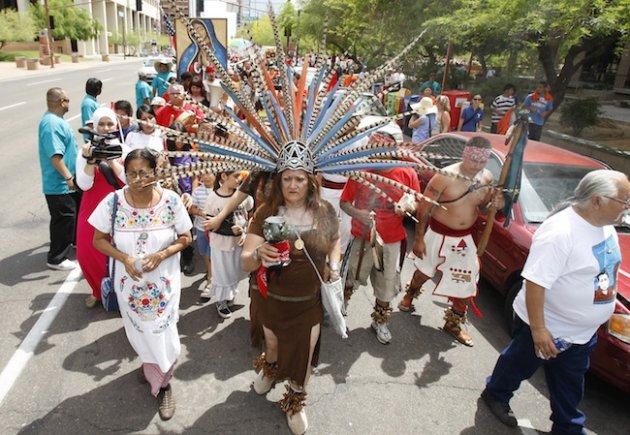 Hundreds of immigrants protesters on the one-year anniversary of SB1070. (AP Photo/Ross D. Franklin)
Hundreds of immigrants protesters on the one-year anniversary of SB1070. (AP Photo/Ross D. Franklin)
Erika Andiola still remembers the day Arizona's tough anti-illegal immigration bill, known as SB1070, passed. She had been protesting outside the state capitol for days, sleeping on the ground and fasting, when the word spread through the crowd. She got a call from her mother, who, like Andiola, is undocumented. She told her daughter not to move because she was afraid she would get taken away by the police and deported.
"There was a moment of panic where people heard on the news that it [passed] but didn't know what was going to happen," Andiola says. "My family didn't go to work the next two days because they thought there were going to be police outside the door."
The law, which was blocked by a federal judge and which the Supreme Court will review in oral arguments Wednesday morning, required local police to ask about immigration status during stops in some cases. Over the next few months, about 10 of the 50 or so young undocumented activists with whom Andiola protested moved to other states. Whole apartment complexes emptied out. "There were neighborhoods that were literally gone," she says.
And that was exactly the point, at least from the perspective of those supporting the law: undocumented immigrants were encouraged to leave. According to government figures, the illegal immigrant population in Arizona shrank to 360,000 last year, which means 200,000 have left since 2008. Researchers attribute the drop to the poor economy and housing bust, as well as the state's E-Verify law, which required employers to check immigration status starting in 2008. SB1070 passed in April of 2010, pushing even more immigrant families out the door. Advocates of the law have touted the out-migration as part of its success and proof that "self deportation" works.
"I think SB1070 was the last nail in the coffin if you will in terms of forcing people to exit the state in search of a better environment and better opportunities," says Edmundo Hidalgo, the president of Chicanos por La Causa, an advocacy group in Phoenix. "Those families that could exit the state ended up leaving."
Andiola and her family, however, did not join this exodus. When she was only 11 years old, they moved to Mesa, a suburb of Phoenix that is about a quarter Latino, after crossing the border illegally guided by coyotes. Even before SB1070 passed, Andiola and her family were worried about being caught and deported by local authorities because of Maricopa County Sheriff Joe Arpaio's very public campaign against illegal immigrants. The Spanish-language radio station would warn its listeners about Arpaio-led raids nearly every day while Andiola was a student at Arizona State University, where she got her degree in psychology in 2009. (Her scholarship to ASU was rescinded once Proposition 300 went into effect in 2006, which outlawed public scholarships to undocumented students. She relied on private scholarships to help fund her junior and senior years.) One of her uncles was placed in deportation proceedings after a home raid, and her mother was caught up in a workplace raid at a water park. After SB1070 passed, the family worried that "it was going to be not only the sheriff but the police" trying to catch them.
Even so, they decided to stay put.
"We didn't leave and the only reason is we have our family here," she says. "We really don't know anything else other than Mexico, but that was 15 years ago."
Andiola became more involved in advocating for the Dream Act, which would legalize some young people who were brought to the country as children. She also began educating illegal immigrants in Arizona about what SB1070 actually said, and what their rights are if they are stopped by the police. In 2011, she helped get out the vote efforts to have SB1070 author Russell Pearce booted from the state senate. She's turned her activism into a business, consulting for some political campaigns.
"We're definitely much less afraid than before because we've seen that it's not as bad as we thought it was going to be," Andiola says of SB1070. This was partly due to the fact that the federal court blocked the law and Arpaio was already clamping down on a lot of the things the law sought to enforce anyway.
Kat Rodriguez, who leads the Coalición de Derechos Humanos advocacy group in Tucson, says she hasn't seen the same improvement since the law passed. SB1070 has fostered a climate of fear in the border town, even though it never went into effect, she says. "There's been so much emboldened collaboration between border control and police," she says. "What we hear from undocumented people is that other than going to work, getting our kids to school, getting groceries and maybe church, we don't leave our houses. Their lives have changed dramatically."